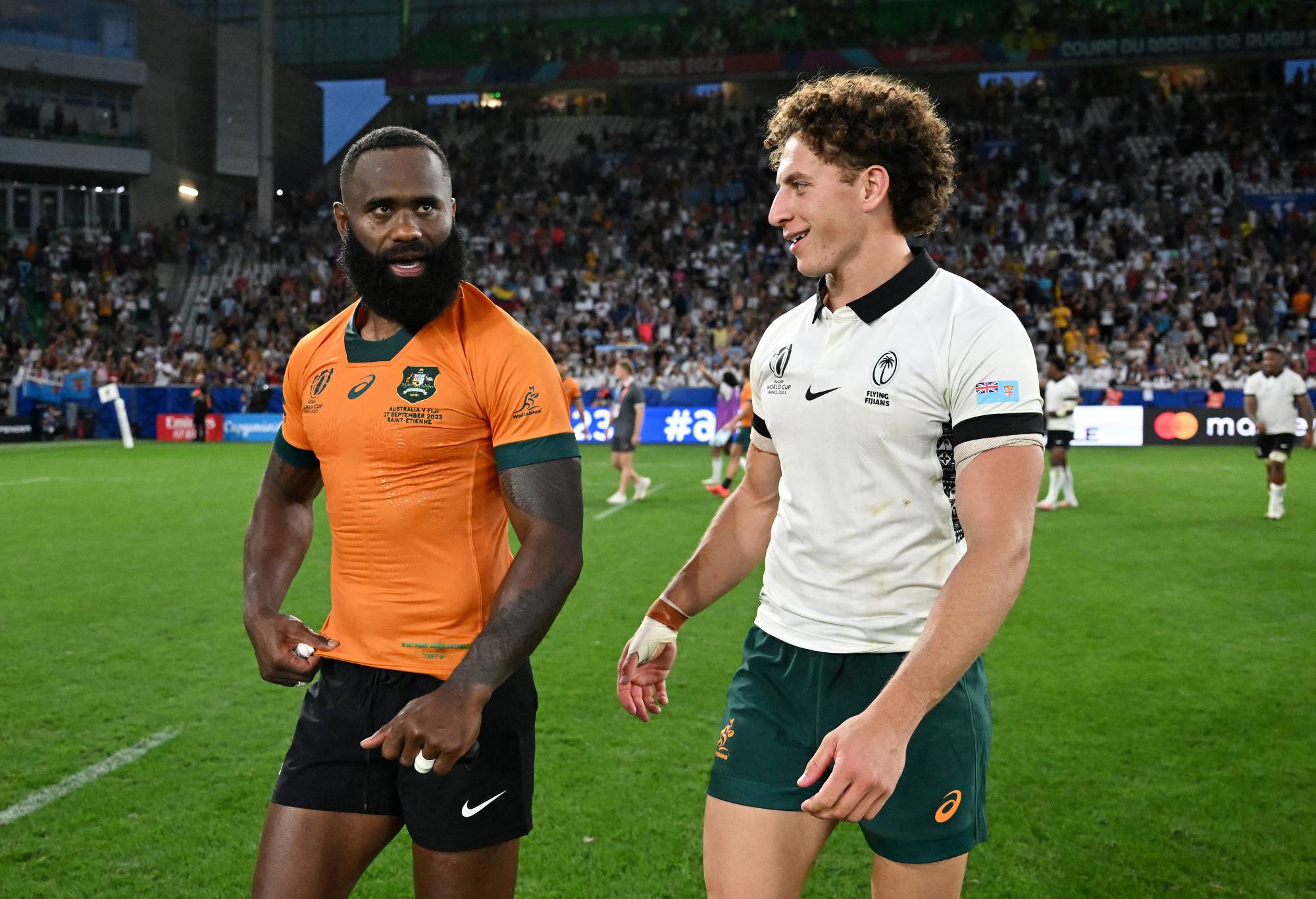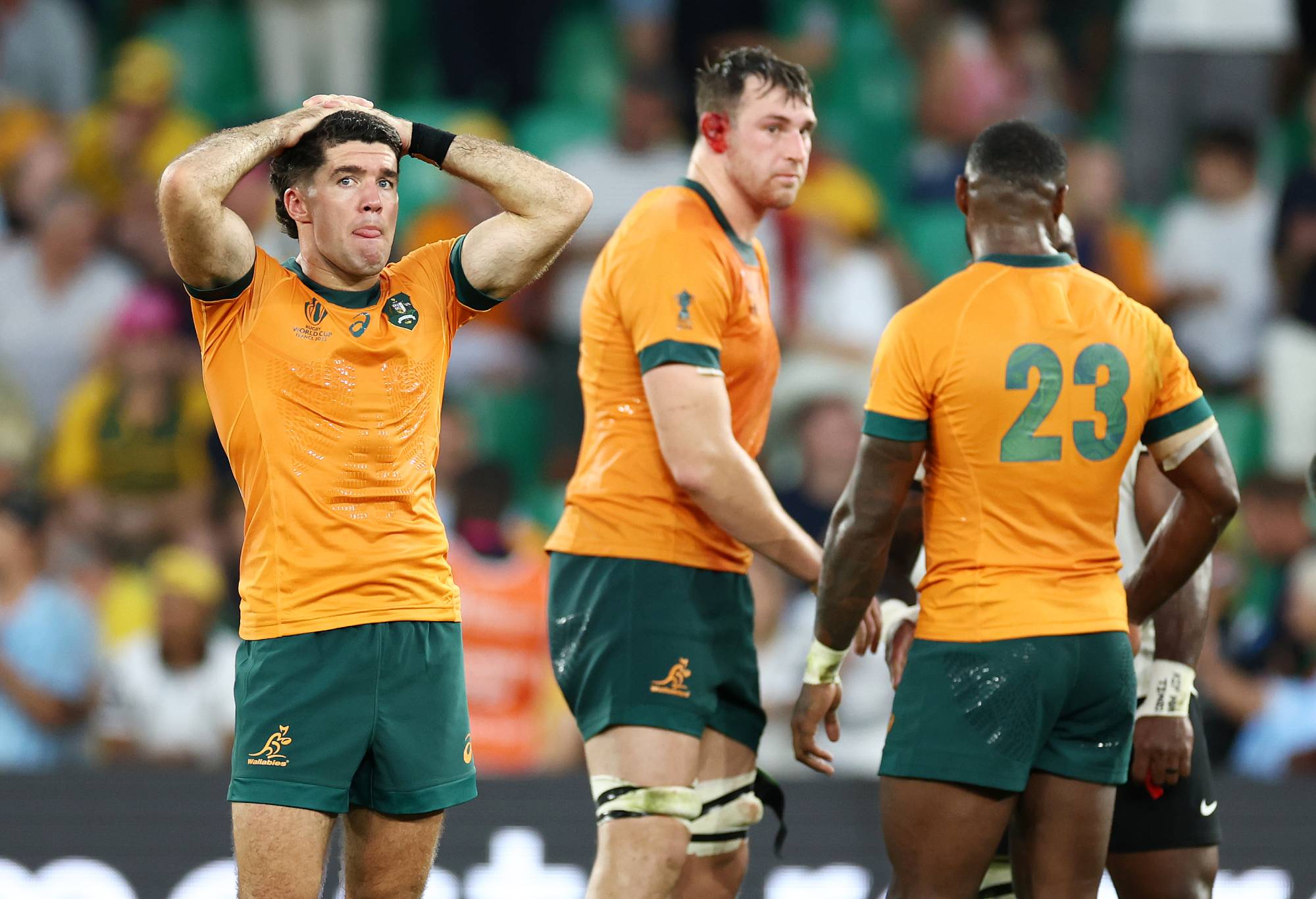SAINT ETIENNE – After a promising opening weekend, where Georgia was dispatched with relative comfort and conviction, Australia’s World Cup took a dark turn during the second week. Losing Taniela Tupou was one thing, but Will Skelton, blossoming as captain, following him onto the Medicab was scarcely believable.
Both succumbed to soft tissue injuries sustained at training. Not a new phenomenon for the Wallabies in recent years, and the subject of a review commissioned at the end of the 2022 season, the findings of which were never publicly released.
From outside the inner sanctum, it’s pointless speculating about the cause and the extent of each injury. But there is more than a whiff of history repeating itself.
The official line was that Skelton would be given right up until the last minute to prove his fitness. That also felt more than a bit whiffy, and so it proved when Skelton was seen entering the stadium dragging a moon boot.
Australia being without their two power forwards thus opened the door, not for history to repeat itself but, but for history to be written. Fiji’s win in St Etienne was just their third against Australia, the first since 1954 and way more convincing than the 22-15 score-line suggested.
Tupou’s absence meant a heavy onus passed on to Angus Bell, who duly obliged with a strong early hit up, setting up Ben Donaldson’s opening penalty goal.
As expected, Fiji threw everything at the Wallabies; hard, early and often, but the Wallabies’ lateral coverage was as good as it has been all year, and the tackling willing.
Everywhere, the collisions were jarring; this was no place for half-measures, with or without the ball.
When Fiji intelligently worked space for big Semi Radradra to get a menacing rumble on, Samu Kerevi lined him up and smashed him into the turf with conviction. Payback was Josua Tuisova isolating and going full steamroller on Carter Gordon. Minutes later, Tuisova repeated the dose on Rob Valetini, seemingly just for fun.

Semi Radradra of Fiji speaks with Mark Nawaqanitawase of Australia after exchanging their match shirts. (Photo by Pauline Ballet – World Rugby/World Rugby via Getty Images)
The game broke open in the 24th minute when Rory Arnold was afforded extraordinary licence by referee Andrew Brace to hook a turnover back off the deck. Nic White wasn’t waiting around to argue the niceties, ripping off a magnificent 50:22, for Mark Nawaqanitawase to prove himself sharpest man on the pitch and engineer himself a try from the quick throw-in, albeit the throw in not quite going the full five metres.
Things were nicely poised at halftime, but went south for the Wallabies soon after, Gordon and Nawaqanitawase getting their wires crossed on a high kick, leaving Tuisova with an unattended fast lane to the try line.
One thing the Wallabies did well in the first half to be decisive in their defensive decision making, As is necessary against a powerful, in-your-face opponent. This was a classic mine/yours outfield cricket catch snafu, where the mistake, if there was to be one, needed both players to be committing to the ball, not both seeing the other out of the corner of their eye, and pulling out.
The second half degenerating into an arm-wrestle favoured only one side. Fiji was winning the collision, the turnover, the scrum and the maul, and with it, the penalty count. And they were doing just enough in their weakest suit, the lineout.

Ben Donaldson of Australia looks dejected at full-time following the Rugby World Cup France 2023 match between Australia and Fiji at Stade Geoffroy-Guichard on September 17, 2023 in Saint-Etienne, France. (Photo by Chris Hyde/Getty Images)
Wondering where a circuit-breaker might come for the Wallabies, Nick Frost ambling across field into an outmanned contact situation spoke to a lack of ‘go-forward’ focus.
Joran Uelese charging into the hip of a Fijian decoy runner spoke to desperation minus the requisite finesse.
Ben Donaldson nudging a penalty kick 10 metres to the 10m line instead of the 5m line spoke to a lack of purpose and confidence.
What the Wallabies did have though was plenty of resolve, and an efficient maul in the 68th minute opened the door for Suliasi Vunivalu to ferret his way over. With an excellent exit from Donaldson, steals from Matt Philip and Frost, and things back to a one-score game, suddenly it was Fiji who were under pressure.
Fiji held their nerve however, and held their passes. Offered one final chance to go 60 metres for a draw, the Wallabies final effort came to nothing; Andrew Brace giving the Fijian scrum the pay they probably should have had much earlier.
Worthy winners, Fiji might have helped themselves more if not for their tendency to ignore the obvious route through the hands, and overuse the floating miss pass to their wingers.
On the plus side, impressive goalkicking by halfback Simione Kuruvoli, who struck an impressive five goals until replaced early in the second half, was an illustration of a mature side with clarity of mission, happy to accumulate points.
Post-mortems and free advice will no doubt come thick and fast for the Wallabies. But whatever the hurt and damage, there mustn’t be a clouding of what is required this week; a quick dusting off and a full focus on Wales.
That’s easier said than done; the prospect of an early trip home looms large, but coach Eddie Jones, just as he did when talking to media immediately afterwards, will do all he can to wear the flak, and keep his ‘young team’ – and all its flaws – on the best possible path forward.
With Group C everyone’s favourite, fun group – aside from the Wallabies – there are still many possibilities in store. Who knows how important Wales scratching out two late tries against Portugal on Saturday, or Frank Lomani’s late penalty miss – which failed to deprive Australia of a bonus point – will prove?
Everywhere else, the second weekend of matches went largely to plan, in terms of expected winners and losers, although how each of the main contenders got there was quite a mixed bag.
Uruguay is a team on the up, and they caused France plenty of headaches, with the 27-12 score-line only one point larger than New Zealand’s loss on opening night. Which kind of sets things up beautifully for when the All Blacks and Uruguay clash in Lyon, on the 5th October.
Having made numerous changes from Paris, France’s second unit might have expected a more fluent, and percentage-boosting win. But in the pools where there are two clear standouts and the rest – with due respect to Italy – the matches against the so-called ‘Tier Two’ nations don’t carry a huge significance.
Run some players into form, stay injury free, tick it off and move on to the next one.
Oh, and don’t pick up any red cards along the way! New Zealand fell short in this regard, Ethan De Groot carelessly turning his shoulder into contact and suffering a deserved sanction. Two matches after tackle-school discount will still see him available for the quarter-final, but it’s fair to say that his World Cup hasn’t gone to plan so far.
There was a lot to like about the All Blacks’ performance, most notably their intent. The desire to play expansively was ever-present but, save for a skittery final ten minutes, there was a refreshing directness and simplicity to their game.
The All Blacks now have the best part of a fortnight off until they tackle Italy, who will provide substantially more headaches than what the Namibians were able to provide. That should also coincide with the return of Sam Cane, Shannon Frizell and Jordie Barrett, and a change of gear approaching the business end of the tournament.
Ireland managed to sneak through the first week, and got through their bruise-a-thon against Tonga; comfortably on the scoreboard, less so in the living of it. Despite the excitement around France and South Africa so far, they won’t manage to sneak under the radar for much longer.
Having survived criticism for loading too many forwards onto their bench, South Africa duly replaced their injured hooker, Malcolm Marx, with a back, Handre Pollard, carrying their four halfbacks along for good measure.
One thing to take from this, is that when it comes to squad composition, there is no template. Sides cut their cloth according to the material they have at their disposal, and what works in one camp would be unworkable in another.
Timing is also key. It’s one thing to replace a player in the first week, but as elimination matches loom, insurance plays – to ensure squad depth is maintained – begin to lose significance. It’s about what the best remaining 23 can do that really matters.
This applies to Australia as much as anyone. If things aren’t turned around against Wales, then whoever makes up the wider squad will count for little.
So, after a heck of an afternoon at Geoffroy Guichard Stadium, all roads now lead to Lyon. It’s going to be one enormous week. Agonising and anxious. Jones versus Gatland. Boyo’s and yobbo’s wandering around in droves. Everything to play for.






























































































